AI and Google Sheets Integration Revolutionizes Cold Email Outreach Automation
Are you a solopreneur or running a small team and struggling with the time-consuming task of sending cold emails to potential clients? Crafting and sending each email by hand can really eat into your resources. But don't worry, there's a way to streamline this process using AI automation. In this article, we'll explore how you can automate your cold email outreach by integrating Google Sheets, web scraping, and tools like Make.com. This approach not only personalizes your emails but also saves you a significant amount of time and effort.
Key Points
- Automate personalized email outreach to prospective clients.
- Use Google Sheets as a central repository for prospect data.
- Employ web scraping techniques to gather prospect information automatically.
- Integrate AI tools like Make.com to automate email sending based on Google Sheets data.
- Save time and resources by reducing manual email efforts.
- Ensure email personalization for higher engagement and conversion rates.
Introduction to Automated Cold Email Outreach
The Challenge of Manual Cold Emailing
Manually sending out cold emails can feel like a never-ending task. It takes a lot of time to find potential clients, gather their contact details, write personalized emails, and then keep track of their responses. This method just isn't scalable and can really hold back your outreach, especially when resources are tight. But by automating this process, you can send out more emails in less time and shift your focus to other areas of your business.
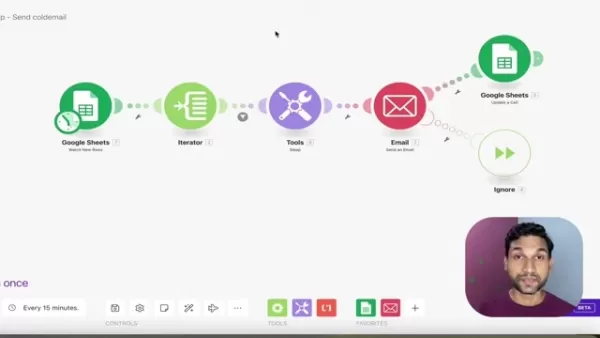
The Power of AI Automation
AI automation can be a game-changer for your cold email strategy. It can handle the heavy lifting of gathering prospect information, crafting personalized emails, and even scheduling follow-ups. With AI, you can streamline your outreach, making it more efficient and effective. Integrating AI automation into your workflow will free up your time and resources, allowing you to focus on growing your business.
Building Your Automated Cold Email System
Step 1: Centralizing Data with Google Sheets
The first step in setting up your automated cold email system is to gather all your prospect data into a Google Sheet. You'll want to create columns for key information like names, email addresses, website URLs, and any other relevant details. This will be the backbone of your automation, keeping all your leads organized and ready for your email campaign.
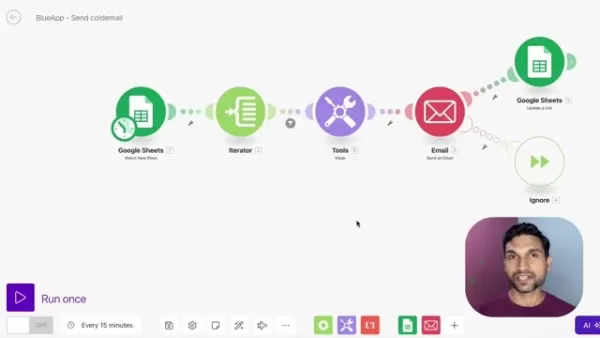
Here's an example of what your Google Sheet columns might look like:
Column Header Description GBP Link Google Business Profile Link Rating Rating of the business Total Review The total review of the business Total Revi Address Full Address of the business Website URL for company website Country Cod Phone Country Code & Phone Number Email Company Contact Email FB Page Facebook URL Instagram Instagram Profile Link LinkedIn LinkedIn URL First email sent YES, if email was sent out/ NO, if email was not sent
Step 2: Automating Data Collection with Web Scraping
Gathering prospect data manually is a real time-sink. That's where web scraping comes in handy. By using web scraping tools, you can automatically pull data from websites and fill in your Google Sheet. This can speed up your data collection process significantly. Plus, there are tools out there that can even find email addresses from website data, making your email outreach campaign even more efficient.
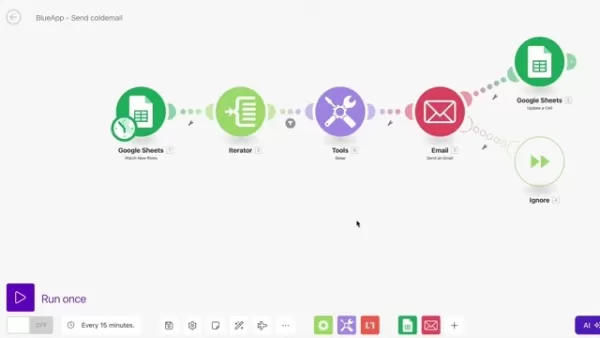
Step 3: Integrating Make.com for Automation
Make.com is a powerful automation platform that lets you connect different apps and services. You'll use it to link your Google Sheet with your email sending platform, automating the process of sending personalized emails based on the data in your sheet. Make.com uses a drag-and-drop module system, making it easy to set up your workflow and trigger automated tasks.
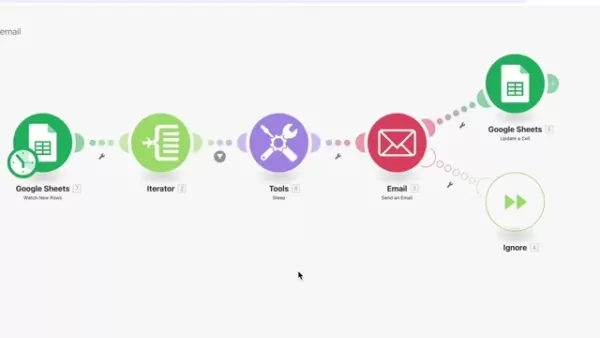
Step 4: Personalizing Emails with Dynamic Content
Personalization is key to successful cold emailing. With Make.com, you can dynamically insert data from your Google Sheet into your emails. This means you can address each prospect by name, mention their website, and tailor your message to their specific needs. Personalized emails stand out and are more likely to get a response than generic ones. Don't forget to include the company name and key selling points to make your emails even more engaging.
How to Automate Cold Emails with Make.com
Configuring Google Sheets Module
Start by setting up a 'Watch New Rows' module in Make.com that's connected to your Google Sheet. This module will trigger your automation whenever a new row is added to your sheet, ensuring your emails go out automatically.
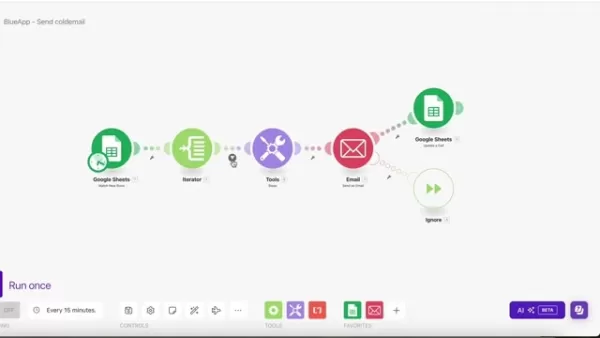
Setting Up the Iterator Module
If you're dealing with multiple rows at once, you'll need an 'Iterator' module to loop through each row in your Google Sheet. This ensures that each prospect gets an individual email, rather than a generic blast.
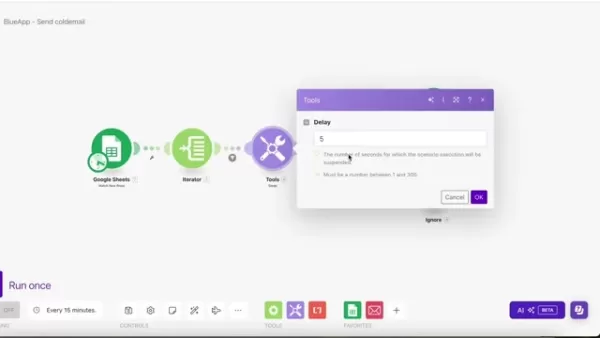
Adding a Filter Module for Email Validation
To avoid sending emails to invalid addresses, add a 'Filter' module to check for proper email formatting and make sure the email column isn't empty. This step helps prevent errors and keeps your sending reputation intact.
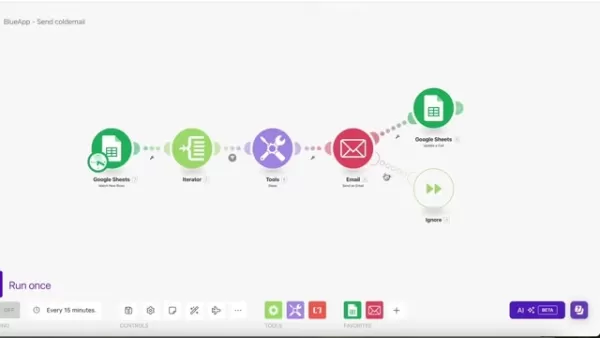
Adding a Delay Module
It's a good idea to add a 'Delay' module to space out your email sending. This prevents your emails from being flagged as spam. A delay of a few seconds between emails usually does the trick.
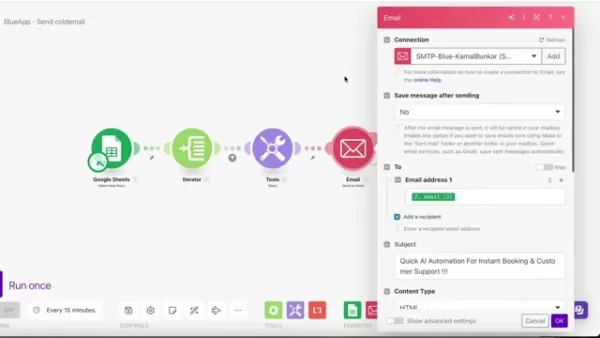
Configuring the Email Module
Set up an 'Email' module using your preferred email sending service, like SMTP or Gmail. Configure it to send personalized emails using the data from your Google Sheet. Make sure to include a compelling subject line and a clear call to action to increase your chances of a response.
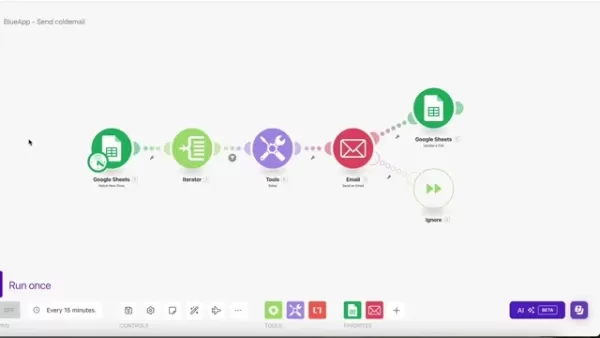
Adding an Ignore Module
Include an 'Ignore' module to handle any errors that might occur. If an email fails to send, this module will keep your automation running smoothly, allowing it to continue processing other rows.
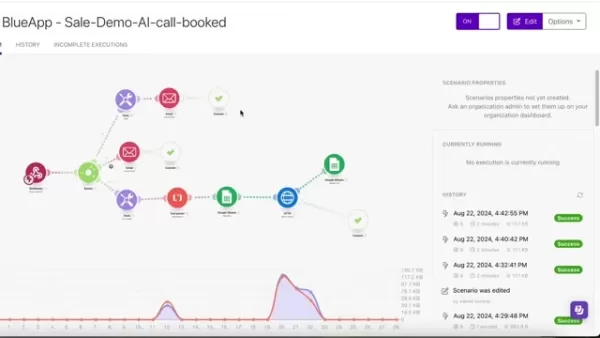
Updating Google Sheets
Finally, add a 'Google Sheets' module to update your sheet after an email is sent. This can mark the email as sent or record the date of the email, helping you track your outreach progress.
Pricing for Automation Tools
Understanding Make.com's Pricing
Make.com offers different pricing plans based on the number of operations and data transfer you need. It's important to review their pricing page and choose a plan that fits your usage needs. Consider how many emails you plan to send and the complexity of your automation workflows. The more tasks you automate per month, the higher the cost, but it can be well worth it if you're saving significant time and money. Keep in mind there's a free plan, but it's often limited in what it can do.
Advantages and Disadvantages of AI Automation
Pros
- Increased Efficiency
- Enhanced Personalization
- Improved Scalability
Cons
- Cost of Implementation
- Technical Expertise Required
- Potential for Errors
Key Features for Cold Email Automation
Dynamic Content Insertion
The ability to insert dynamic content from Google Sheets into your emails is crucial. It allows you to personalize your messages and create more engaging content, which is far more effective than sending out mass emails that might get flagged as spam.
Conditional Logic
Use conditional logic to tailor your email sending based on specific criteria in your Google Sheet. For example, you can send different emails to prospects based on their industry or company size, which is especially useful for custom marketing campaigns.
Error Handling
Proper error handling is essential to keep your automation running smoothly. Implement mechanisms to prevent your automation from stopping due to invalid email addresses or other issues.
Use Cases for Automated Cold Email Outreach
Lead Generation
Automate your initial outreach to potential leads, introducing your product or service and capturing their interest. Use a web scraper to build your lead list and let automated Google Sheets send out your email campaign.
Sales Prospecting
Identify and connect with potential sales prospects, tailoring your message to their specific needs and pain points. For instance, if you know one of their weaknesses, focus your selling point on addressing that pain point.
Partnership Outreach
Reach out to potential partners, proposing collaborations and exploring mutually beneficial opportunities. If you're selling complementary products, this could lead to a fruitful business relationship.
FAQ
What is the most crucial element of cold emailing automation?
Personalization and ensuring emails do not get flagged as spam are key. Think carefully about your key selling points and personalize your message to make recipients more likely to engage with your content.
What is Make.com?
Make.com is a visual platform that lets you design, build, and automate anything – from simple tasks to complex workflows. It connects apps and automates workflows using a drag-and-drop interface, with pricing based on operations.
Related Questions
How can I improve the deliverability of my automated cold emails?
To boost the deliverability of your automated cold emails, consider these strategies:
- Email Authentication: Set up protocols like SPF, DKIM, and DMARC to verify your authority to send emails from your domain. This builds trust with ISPs and reduces the chance of being marked as spam.
- Dedicated IP Addresses: Use dedicated IP addresses for sending emails to build a positive sending reputation.
- Warm-Up Your IP Address: Gradually increase your email volume over time to avoid triggering spam filters.
- Monitor Your Sending Reputation: Regularly check your sending reputation using tools like Sender Score or Google Postmaster Tools to identify and address deliverability issues.
- Personalization and Segmentation: Personalize your emails to increase engagement and reduce the likelihood of being marked as spam. Segment your list based on criteria like industry or company size.
- Avoid Spam Trigger Words: Steer clear of words or phrases that trigger spam filters, like "free," "guarantee," or excessive use of exclamation marks.
- Use Plain Text Versions: Provide both HTML and plain text versions of your emails to cater to different recipient preferences.
- Maintain Clean Email Lists: Regularly remove inactive or invalid email addresses to protect your sending reputation.
- Test Your Emails: Use tools like Mail-Tester to identify and fix deliverability issues before launching your campaign.
- Monitor Engagement Metrics: Keep an eye on open rates, click-through rates, and bounce rates to understand and improve engagement.
- Obtain Explicit Consent: Ensure you have permission from recipients before sending emails to comply with regulations like GDPR and CAN-SPAM.
- Provide Easy Unsubscribe Options: Include a clear unsubscribe link in every email to comply with regulations and respect recipient preferences.
- Use a Consistent From Address: Maintain a consistent from address to build brand recognition and trust.
- Optimize Sending Times: Experiment with different sending times to find when your recipients are most likely to engage.
- Authenticate Your Domain with DNS Records: Properly configure your DNS records to include SPF, DKIM, and DMARC to prevent spoofing and phishing.
By implementing these techniques, you can significantly improve the deliverability of your automated cold emails and enhance the effectiveness of your outreach efforts.
Related article
 Topaz DeNoise AI: Best Noise Reduction Tool in 2025 – Full Guide
In the competitive world of digital photography, image clarity remains paramount. Photographers at all skill levels contend with digital noise that compromises otherwise excellent shots. Topaz DeNoise AI emerges as a cutting-edge solution, harnessing
Topaz DeNoise AI: Best Noise Reduction Tool in 2025 – Full Guide
In the competitive world of digital photography, image clarity remains paramount. Photographers at all skill levels contend with digital noise that compromises otherwise excellent shots. Topaz DeNoise AI emerges as a cutting-edge solution, harnessing
 Master Emerald Kaizo Nuzlocke: Ultimate Survival & Strategy Guide
Emerald Kaizo stands as one of the most formidable Pokémon ROM hacks ever conceived. While attempting a Nuzlocke run exponentially increases the challenge, victory remains achievable through meticulous planning and strategic execution. This definitiv
Master Emerald Kaizo Nuzlocke: Ultimate Survival & Strategy Guide
Emerald Kaizo stands as one of the most formidable Pokémon ROM hacks ever conceived. While attempting a Nuzlocke run exponentially increases the challenge, victory remains achievable through meticulous planning and strategic execution. This definitiv
 AI-Powered Cover Letters: Expert Guide for Journal Submissions
In today's competitive academic publishing environment, crafting an effective cover letter can make the crucial difference in your manuscript's acceptance. Discover how AI-powered tools like ChatGPT can streamline this essential task, helping you cre
Comments (2)
0/200
AI-Powered Cover Letters: Expert Guide for Journal Submissions
In today's competitive academic publishing environment, crafting an effective cover letter can make the crucial difference in your manuscript's acceptance. Discover how AI-powered tools like ChatGPT can streamline this essential task, helping you cre
Comments (2)
0/200
![WilliamAnderson]() WilliamAnderson
WilliamAnderson
 July 28, 2025 at 2:45:48 AM EDT
July 28, 2025 at 2:45:48 AM EDT
This AI-Google Sheets combo for cold emails sounds like a game-changer! I’ve been drowning in manual outreach for my startup, so this could save me hours. Gotta try it out! 🚀


 0
0
![BillyAdams]() BillyAdams
BillyAdams
 July 27, 2025 at 9:19:30 PM EDT
July 27, 2025 at 9:19:30 PM EDT
This AI-Google Sheets combo sounds like a game-changer for cold emails! As a freelancer, I’m stoked to try automating my outreach. Any tips on avoiding spam filters with this? 😎


 0
0
Are you a solopreneur or running a small team and struggling with the time-consuming task of sending cold emails to potential clients? Crafting and sending each email by hand can really eat into your resources. But don't worry, there's a way to streamline this process using AI automation. In this article, we'll explore how you can automate your cold email outreach by integrating Google Sheets, web scraping, and tools like Make.com. This approach not only personalizes your emails but also saves you a significant amount of time and effort.
Key Points
- Automate personalized email outreach to prospective clients.
- Use Google Sheets as a central repository for prospect data.
- Employ web scraping techniques to gather prospect information automatically.
- Integrate AI tools like Make.com to automate email sending based on Google Sheets data.
- Save time and resources by reducing manual email efforts.
- Ensure email personalization for higher engagement and conversion rates.
Introduction to Automated Cold Email Outreach
The Challenge of Manual Cold Emailing
Manually sending out cold emails can feel like a never-ending task. It takes a lot of time to find potential clients, gather their contact details, write personalized emails, and then keep track of their responses. This method just isn't scalable and can really hold back your outreach, especially when resources are tight. But by automating this process, you can send out more emails in less time and shift your focus to other areas of your business.

The Power of AI Automation
AI automation can be a game-changer for your cold email strategy. It can handle the heavy lifting of gathering prospect information, crafting personalized emails, and even scheduling follow-ups. With AI, you can streamline your outreach, making it more efficient and effective. Integrating AI automation into your workflow will free up your time and resources, allowing you to focus on growing your business.
Building Your Automated Cold Email System
Step 1: Centralizing Data with Google Sheets
The first step in setting up your automated cold email system is to gather all your prospect data into a Google Sheet. You'll want to create columns for key information like names, email addresses, website URLs, and any other relevant details. This will be the backbone of your automation, keeping all your leads organized and ready for your email campaign.

Here's an example of what your Google Sheet columns might look like:
| Column Header | Description |
|---|---|
| GBP Link | Google Business Profile Link |
| Rating | Rating of the business |
| Total Review | The total review of the business |
| Total Revi Address | Full Address of the business |
| Website | URL for company website |
| Country Cod Phone | Country Code & Phone Number |
| Company Contact Email | |
| FB Page | Facebook URL |
| Instagram Profile Link | |
| LinkedIn URL | |
| First email sent | YES, if email was sent out/ NO, if email was not sent |
Step 2: Automating Data Collection with Web Scraping
Gathering prospect data manually is a real time-sink. That's where web scraping comes in handy. By using web scraping tools, you can automatically pull data from websites and fill in your Google Sheet. This can speed up your data collection process significantly. Plus, there are tools out there that can even find email addresses from website data, making your email outreach campaign even more efficient.

Step 3: Integrating Make.com for Automation
Make.com is a powerful automation platform that lets you connect different apps and services. You'll use it to link your Google Sheet with your email sending platform, automating the process of sending personalized emails based on the data in your sheet. Make.com uses a drag-and-drop module system, making it easy to set up your workflow and trigger automated tasks.

Step 4: Personalizing Emails with Dynamic Content
Personalization is key to successful cold emailing. With Make.com, you can dynamically insert data from your Google Sheet into your emails. This means you can address each prospect by name, mention their website, and tailor your message to their specific needs. Personalized emails stand out and are more likely to get a response than generic ones. Don't forget to include the company name and key selling points to make your emails even more engaging.
How to Automate Cold Emails with Make.com
Configuring Google Sheets Module
Start by setting up a 'Watch New Rows' module in Make.com that's connected to your Google Sheet. This module will trigger your automation whenever a new row is added to your sheet, ensuring your emails go out automatically.

Setting Up the Iterator Module
If you're dealing with multiple rows at once, you'll need an 'Iterator' module to loop through each row in your Google Sheet. This ensures that each prospect gets an individual email, rather than a generic blast.

Adding a Filter Module for Email Validation
To avoid sending emails to invalid addresses, add a 'Filter' module to check for proper email formatting and make sure the email column isn't empty. This step helps prevent errors and keeps your sending reputation intact.

Adding a Delay Module
It's a good idea to add a 'Delay' module to space out your email sending. This prevents your emails from being flagged as spam. A delay of a few seconds between emails usually does the trick.

Configuring the Email Module
Set up an 'Email' module using your preferred email sending service, like SMTP or Gmail. Configure it to send personalized emails using the data from your Google Sheet. Make sure to include a compelling subject line and a clear call to action to increase your chances of a response.

Adding an Ignore Module
Include an 'Ignore' module to handle any errors that might occur. If an email fails to send, this module will keep your automation running smoothly, allowing it to continue processing other rows.

Updating Google Sheets
Finally, add a 'Google Sheets' module to update your sheet after an email is sent. This can mark the email as sent or record the date of the email, helping you track your outreach progress.
Pricing for Automation Tools
Understanding Make.com's Pricing
Make.com offers different pricing plans based on the number of operations and data transfer you need. It's important to review their pricing page and choose a plan that fits your usage needs. Consider how many emails you plan to send and the complexity of your automation workflows. The more tasks you automate per month, the higher the cost, but it can be well worth it if you're saving significant time and money. Keep in mind there's a free plan, but it's often limited in what it can do.
Advantages and Disadvantages of AI Automation
Pros
- Increased Efficiency
- Enhanced Personalization
- Improved Scalability
Cons
- Cost of Implementation
- Technical Expertise Required
- Potential for Errors
Key Features for Cold Email Automation
Dynamic Content Insertion
The ability to insert dynamic content from Google Sheets into your emails is crucial. It allows you to personalize your messages and create more engaging content, which is far more effective than sending out mass emails that might get flagged as spam.
Conditional Logic
Use conditional logic to tailor your email sending based on specific criteria in your Google Sheet. For example, you can send different emails to prospects based on their industry or company size, which is especially useful for custom marketing campaigns.
Error Handling
Proper error handling is essential to keep your automation running smoothly. Implement mechanisms to prevent your automation from stopping due to invalid email addresses or other issues.
Use Cases for Automated Cold Email Outreach
Lead Generation
Automate your initial outreach to potential leads, introducing your product or service and capturing their interest. Use a web scraper to build your lead list and let automated Google Sheets send out your email campaign.
Sales Prospecting
Identify and connect with potential sales prospects, tailoring your message to their specific needs and pain points. For instance, if you know one of their weaknesses, focus your selling point on addressing that pain point.
Partnership Outreach
Reach out to potential partners, proposing collaborations and exploring mutually beneficial opportunities. If you're selling complementary products, this could lead to a fruitful business relationship.
FAQ
What is the most crucial element of cold emailing automation?
Personalization and ensuring emails do not get flagged as spam are key. Think carefully about your key selling points and personalize your message to make recipients more likely to engage with your content.
What is Make.com?
Make.com is a visual platform that lets you design, build, and automate anything – from simple tasks to complex workflows. It connects apps and automates workflows using a drag-and-drop interface, with pricing based on operations.
Related Questions
How can I improve the deliverability of my automated cold emails?
To boost the deliverability of your automated cold emails, consider these strategies:
- Email Authentication: Set up protocols like SPF, DKIM, and DMARC to verify your authority to send emails from your domain. This builds trust with ISPs and reduces the chance of being marked as spam.
- Dedicated IP Addresses: Use dedicated IP addresses for sending emails to build a positive sending reputation.
- Warm-Up Your IP Address: Gradually increase your email volume over time to avoid triggering spam filters.
- Monitor Your Sending Reputation: Regularly check your sending reputation using tools like Sender Score or Google Postmaster Tools to identify and address deliverability issues.
- Personalization and Segmentation: Personalize your emails to increase engagement and reduce the likelihood of being marked as spam. Segment your list based on criteria like industry or company size.
- Avoid Spam Trigger Words: Steer clear of words or phrases that trigger spam filters, like "free," "guarantee," or excessive use of exclamation marks.
- Use Plain Text Versions: Provide both HTML and plain text versions of your emails to cater to different recipient preferences.
- Maintain Clean Email Lists: Regularly remove inactive or invalid email addresses to protect your sending reputation.
- Test Your Emails: Use tools like Mail-Tester to identify and fix deliverability issues before launching your campaign.
- Monitor Engagement Metrics: Keep an eye on open rates, click-through rates, and bounce rates to understand and improve engagement.
- Obtain Explicit Consent: Ensure you have permission from recipients before sending emails to comply with regulations like GDPR and CAN-SPAM.
- Provide Easy Unsubscribe Options: Include a clear unsubscribe link in every email to comply with regulations and respect recipient preferences.
- Use a Consistent From Address: Maintain a consistent from address to build brand recognition and trust.
- Optimize Sending Times: Experiment with different sending times to find when your recipients are most likely to engage.
- Authenticate Your Domain with DNS Records: Properly configure your DNS records to include SPF, DKIM, and DMARC to prevent spoofing and phishing.
By implementing these techniques, you can significantly improve the deliverability of your automated cold emails and enhance the effectiveness of your outreach efforts.
 Topaz DeNoise AI: Best Noise Reduction Tool in 2025 – Full Guide
In the competitive world of digital photography, image clarity remains paramount. Photographers at all skill levels contend with digital noise that compromises otherwise excellent shots. Topaz DeNoise AI emerges as a cutting-edge solution, harnessing
Topaz DeNoise AI: Best Noise Reduction Tool in 2025 – Full Guide
In the competitive world of digital photography, image clarity remains paramount. Photographers at all skill levels contend with digital noise that compromises otherwise excellent shots. Topaz DeNoise AI emerges as a cutting-edge solution, harnessing
 Master Emerald Kaizo Nuzlocke: Ultimate Survival & Strategy Guide
Emerald Kaizo stands as one of the most formidable Pokémon ROM hacks ever conceived. While attempting a Nuzlocke run exponentially increases the challenge, victory remains achievable through meticulous planning and strategic execution. This definitiv
Master Emerald Kaizo Nuzlocke: Ultimate Survival & Strategy Guide
Emerald Kaizo stands as one of the most formidable Pokémon ROM hacks ever conceived. While attempting a Nuzlocke run exponentially increases the challenge, victory remains achievable through meticulous planning and strategic execution. This definitiv
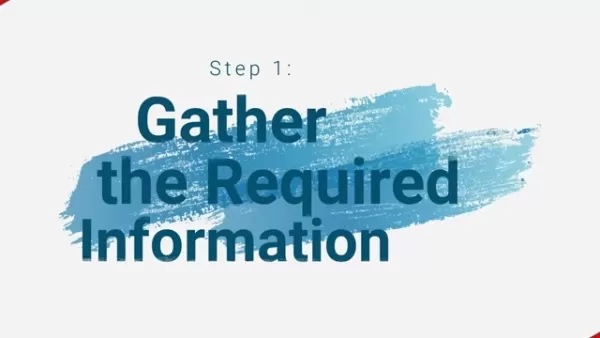 AI-Powered Cover Letters: Expert Guide for Journal Submissions
In today's competitive academic publishing environment, crafting an effective cover letter can make the crucial difference in your manuscript's acceptance. Discover how AI-powered tools like ChatGPT can streamline this essential task, helping you cre
AI-Powered Cover Letters: Expert Guide for Journal Submissions
In today's competitive academic publishing environment, crafting an effective cover letter can make the crucial difference in your manuscript's acceptance. Discover how AI-powered tools like ChatGPT can streamline this essential task, helping you cre
 July 28, 2025 at 2:45:48 AM EDT
July 28, 2025 at 2:45:48 AM EDT
This AI-Google Sheets combo for cold emails sounds like a game-changer! I’ve been drowning in manual outreach for my startup, so this could save me hours. Gotta try it out! 🚀


 0
0
 July 27, 2025 at 9:19:30 PM EDT
July 27, 2025 at 9:19:30 PM EDT
This AI-Google Sheets combo sounds like a game-changer for cold emails! As a freelancer, I’m stoked to try automating my outreach. Any tips on avoiding spam filters with this? 😎


 0
0





























